Life at the Lake
a diary of living at a small lowland lakeWHAT IT'S LIKE
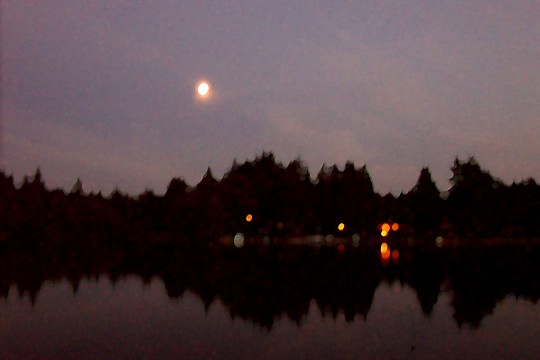
Early moonrise over Lake Ketchum
|
Archive Search |
| Links |
|
and s-integrator |
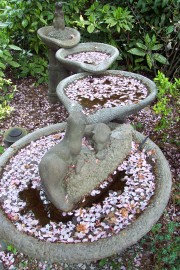
The Four Otter Fountain and Cherry Petals
A quote from my favorite haiku poet, Matsuo Basho:
"From every dirction
cherry blossom petals blow
into Lake Biwa"
(Hamill, p. 126)
and a quote from one of his prose notebooks:
"At nightfall, we found a room in a poor priest's house. I lit a lamp and took out my ink stone and brush. Just as I was remembering the day's scenes and poems I composed along the way, the priest saw me touch my brow, and assumed I suffered from travel fatigue. He insisted on recounting his own youthful travels along with parables from the sutras and miracles he had seen. Unfortunately, his interruption foiled my desire to write. . . ."
(Hamill, p.78)
- - Comments ()
...
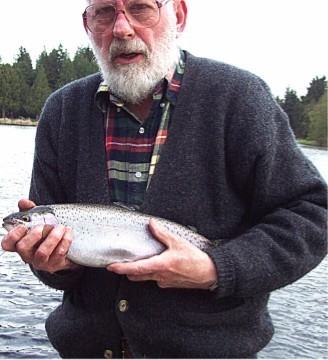
A Spring Holdover Trout
If you've had pretty good fishing, as I've had this spring, and you wish for it to be even better, beware. You may be putting a hex on yourself.
A couple of days ago, from my dock, I caught and released four pan-sized trout in about ten minutes; in the evening I took another before dark, then quit to watch a baseball game on TV.
The next day, nothing, though I spent much more time than I wanted to trying to get the trout to take a green-bodied nymph an inch or two under the surface. I changed flies several times, but to no avail.
The following day before lunch, which is my usual time, I had a couple of what we call "short strikes," but did not hook them, though once I saw a bulge and ring, and the second time the fish itself come up on top when the hook briefly gripped it and came away.
That night, though, baseball was on TV again, I decided to give it another try because I did not want to go fishless for the day. The trout were ringing in a peculiar manner, and often the same trout could be seen making a dimple and, a short moment later, a second dimple or small rise. This was very different from the usual evening take, or feed. And it portended a problem.
I had read about it in English fishing books, long ago. The British call it "smutting." It means a few of the trout are picking up spent insects on the surface after the insects have laid their eggs. The trout are feeding selectively. It was similar to what I had experienced at noon, but different, too. Only a nymph pattern might work.
In order to hook one I would have to watch for the rise and try to determine the direction the feeding trout was headed. Pick the wrong direction and you had no choosey fish maybe to take your fly; pick the right direction and you might have the trout ignore or reject your fly. But do it just right, with the right presentation and retrieve, the trout might just choose to take the fly. But he would take it softly, while cruising. It would not be a hearty or deliberate take.
Most of the time the selective trout ignored my offering. Once or twice I saw a telltale swirl, but felt nothing. Another time or two a tiny pluck and the fly came back to me. Once, though, the fish took firmly, then came off the hook halfway back to where I would have released him, anyway.
So, if you were going to release the trout, why does it make any difference if you lose him? Ah, that is what lies at the heart of fishing. You want to beat the trout at his game—this stupid oblivious creature, a mere fish.
One trout I did hook, though, and he fought as though furious at the deception he had been caught up in, leaping and shaking and running around in angry circles. He was only about ten inches long. It took long moments for him to quiet down enough to grab the leader and shake him free. Then it was over, the fishing for the day and evening.
Next day, nothing again. Things are definitely slowing down on the lake.
- - Comments ()
...
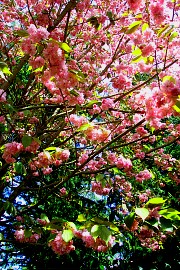
More Cherry Blossoms by Otter Fountain.
Yesterday I wrote about the Japanese verse form, haiku, and how important the blooming of the cherry trees are to its practitioners and how they would make long pilgrimages in order to glimpse the "fleeting beauty" of the trees.
Today I'd like to quote a couple of poems by Basho, the champion of the art form; these are in the translation by Sam Hamill in his book, Narrow Road to The Interior (Shambhala Classics, $14.95).
I use Hamill because he is a poet himself and his translations are very fine and scan perfectly. Often, when others do the translating, they are forced to do one of two things: either they are faithful to the text, as best they can in a language foreign to them, or else they try for the verse form, that is, the 5-7-5 syllable count, achieving it but failing in catching the subtle poetic effects. Without those allusive effects, haiku dissolve into meaningless abstractions.
Even with the effects, they are hard enough for Westerners to grasp.
Basho quotes a favorite poet of his, Chotaro, handed him at a party in Basho's honor:
"Winter approaches—
but in spring you'll see Yoshino
cherry blossoms."
That's all? Right; that's all, and all there need be to give you a taste of the form.
Another haiku by a student of Basho's:
"Embarrassed by
cherry blossoms caught in my hair
at the holy shrine."
Even after considerable thought, I'll admit, the meaning doesn't leap forward, but if it did it would be some other kind of poem.
Basho himself wrote: "Within this temporal body composed of a hundred bones and nine holes there resides a spirit which, for lack of an adequate name, I think of as windblown." (p.55)
I might point out my own fragile cherry blossoms are now falling rapidly into the otter fountain, where they both float and settle pinkly to the bottom, in large numbers, and threaten to overcome the pump, but so far haven't.
I bail them out in handfuls and drop them—sodden pink/white masses—to the ground in mounds.
- - Comments ()
...
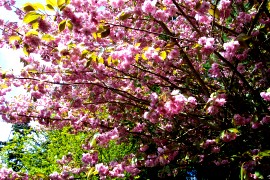
Cherry Tree in Bloom by Otter Fountain.
During the winter I read several books on haiku. This is the Chinese/Japanese verse form, comprising but three lines to a stanza, and those lines of five-seven-five syllables.
In so short a stanza, a great deal can be said, or implied, but it is of a special nature, and often the joy of reading such poetry lies in the culture of the people who seek it out. In other words, to us Westerners it is foreign, and many of its allusions illusions.
Three famous practitioners of haiku are Basho, Buson, and Issa. They lived long ago, but are popularly read today in Japan, and people regularly repeat pilgrimages that Basho in particular made to various holy sites to meet with other poets and exchange idea, and to see the cherry trees when they were in bloom. Often they would walk hundreds of miles for just such a sight.
What? Most Americans wouldn't walk across the street to see a cherry tree in bloom, let alone a whole bunch of them. (The University of Washington Quad is one such sight, and most students walk past the blossoming trees only half-aware of their lush blooms.)
Not the Japanese, who see in them qualities of life being as transitory as the blossoms, and the beauty of the bloom being an annual reminder of the shortness and splendor of life. It is both a glorious and a sad time, the two qualities inextricably interwoven and capable of provoking deep thought.
In my yard on the lake is one large cherry tree for which I claim no responsibility for its being there; it long predated me, at least at the lake. It is presently in full bloom. Beneath it is my otter fountain—a series of four bowls fed by water that is continuously recycled, that is, so long as I keep the electric pump running. A lone statuary otter sits astride the top bowl and a pair of them straddle a stone atop the fourth and largest bowl. There is a bench nearby. (You can meditate there, but you don't have to.)
I'd like to think that Matsuo Basho, would enjoy the sight—the hugeness of the tree, the prolificness of the blooms, the brightness of the colors against a blue sky. I am aware, though, that without the long Japanese cultural tradition, something is amiss in my appreciation.
So I enjoy the blooming tree only to the extent that I can—unforced, limited, incomplete. For me it is enough. It has to be.
(Those books, incidentally, are Robert Haas, The Essential Haiku; Sam Hamill, Narrow Road to the Interior; Faubio Bowers, The Classic Tradition of Haiku, An Anthology. The first named is the best as introduction.)
- - Comments ()
...
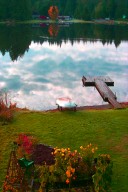
Frog Symphony.
The lake at first light.
Wake to Frog Symphony! Twitter of blackbirds in the cattails, where they are nested. How musical.
Still dark, but the seven AM Amtrak train is making its way North, a full mile away, to Vancouver, blowing its whistle at, first, the Stanwood crossing, then at the Pioneer Highway crossing, and finally at Conway, as I enjoy listening to the Doppler Effect, still nearly asleep.
Dweeter's dairy farm has a new calf and it is bawling for its mom. How country sounds do travel. A plane from Whidbey Island flies by, well below the speed of sound, which is prohibited over land here. And there is the hiss and moan of schoolbus doors opening and closing, and the groan and clang of diesel buses stopping and starting in their quest for kids to fill some of those vacant seats.
A rooster crows. Funny but I don't remember anyone keeping chickens near by. Is there such a thing as a feral rooster? What does he eat? Does he get lonely? Most likely the sound is from a small "hobby" farm that supplies only its owners with eggs, probably delicious brown ones.
And of course there is the cacophony of barking dogs. I sometimes think I can identify the breed from the timbre. There is the shrill yapping of small dogs. Labrador Retrievers are overly familiar to me and omnipresent. My God, those are my own! The neighbor's kids and their dogs are rushing out to make their schoolbus connection, alarming my own Labs, though they've hear the commotion daily for years now. They enjoying egging each other on, I swear.
And I, still drowsy, stumble to my feet and search with my toes for my slippers, one by one. An other day is beginning. And though I am not eager to meet it, it must be met.
That is the signal Rule of Life.
- - Comments ()
...
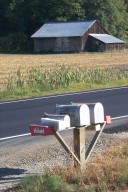
The countryside is full of barns.
And clustered mailboxes.
Are you a Beatle type or a Rolling Stone at heart? Take care how you answer. I'm not asking with which musical group you identify. I'm asking which one you really want to listen to. And it may not be the one you think.
Old stuff, sure, but still relevant, unless you're deep into M&M. The Beatles, which of course no longer exist, have been reissued in a big hits album called "1." It is a single CD on which may be found many of those heart-wrenching singles that so turned us on, back in the fateful '60s.
I remember "I Want To Hold Your Hand" playing over and over at the Red Robin Tavern, back when there was only one such place, not a chain, and it hung over a cliff above Portage Bay in Seattle. All those wonderful chromatic descending chords I and the world couldn't get enough of. I'd come in from an evening's good fishing in Seattle's Green Lake and stood at the bar, clutching my schooner, listening and marveling.
Now the Stones were different. They were gutsy, raw, and tended to rub you the wrong way. But there was no doubt about it, they were rock and roll at its best. "Brown Sugar," "I Can't Get No Satisfaction" (ungrammatical but great), "Let's Spend The Night Together" (no mistaking the message, there), and "Honky Tonk Women" were only a handful of great Stones melodies and it was anybody's guess if the two-CD collection recently reissued as "Forty Licks," contained better music than, say, "Michelle," "Yellow Submarine," "Lucy in the Sky with Diamonds" (which secretly spelled out LSD to the hip), and "Something" ("In The Way She Moves"). Anybody's guess, that is, until you revisited them.
Well, revisited, at least in my case, leaves little doubt who is the best. It is the Rolling Stones. The Beatles' songs are beautiful, fresh, part of our popular musical heritage, but they stand apart from the mainstream rock and roll. They are eccentric, iconoclastic, original. They are wonderful. But they aren't great rock and roll. They are "something else."
It is the Stones who convince me, over and over, that they play an original rock and roll music that can be built upon. The Beatles are beautiful and a dead end. The Stones will go on forever. Long ago—in spite of Paul and Wings—they stopped.
And I've just learned that the Stones keep speaking to me of something new, even after forty years.
- - Comments ()
...

"You don't need an anchor.
Just tie up to my dock, stranger."
Though the lake is open to fishing year round (unlike many other lakes), when the traditional Opening Day comes round, as it did yesterday, an unusual number of boats are unloaded at the public access, and soon the lake becomes dotted with families in boats, everybody fishing.
It makes no sense, because the usual 1k trout were planted 13 days ago, and the fishing has been good ever since. But I guess some people don't know this, or else choose to disregard it, and the idea of getting up early to go fishing is enough of a tradition that people don't want to give it up for practical reasons, such as the lake has been kicking out fish for almost two weeks.
It is a day I usually choose not to fish, but yesterday I poked out for a few minutes at several times in the day and managed to hook half a dozen small fish from my dock. But I think today—peculiarly, there are three times as many people fishing the lake today as yesterday, as noon approaches—the fishing will be poor, with the fish "sore-mouthed" from yesterday, as steelheaders say, or else fed to excess on incidentally lost bait. That is, the trout are glutted, not gutted.
Years ago, somebody in the Department of Fish and Wildlife scheduled the opener for a Sunday in April. You see, openers were traditionally planned for Sundays, but the department was wised up by angry fishers, who pointed out they lost a day off their weekend fishing this way, and so it was changed to Saturday. Anyway, before then, and perhaps because of what happened then, it turned out that the opener fell on Easter Sunday.
"What?" screamed the state's wives and mothers, most of them the same persons. And there was a massive conflict between church and finery and the lake and soiled fishing togs.
It never happened again, and rumor has it (rumor usually being wrong) that the guy in charge of scheduling lost his job.
My guess is that he was promoted by some senior administrator with a weird sense of humor.
- - Comments ()
...